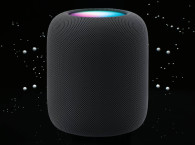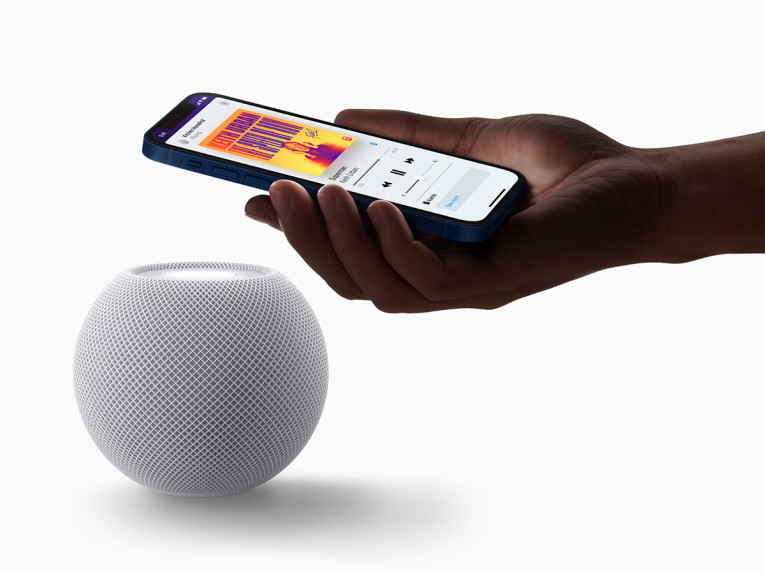
Apple will continue to sell the original HomePod (with very limited availability in only eight countries around the world: U.S., UK, Australia, Canada, France, Germany, Japan, and Taiwan). At least, until it releases a new similar model with an updated processor, like the one introduced in the HomePod mini, because "the brain" in the new model is the reason for its superior abilities.
The newest addition to the HomePod family, stands at 3.3 inches tall and is said to offer an impressive sound, combined with the intelligence of the improving Siri digital assistant, and the superior smart home capabilities of Apple's HomeKit ecosystem. But the new Apple HomePod mini will appeal to most consumers mostly because of its superior integration with all other Apple devices and services, and the fact that - all together - Apple is able to offer a smart home experience that offers comfort and convenience without complexity.
At just 3.3 inches tall, the HomePod mini is packed with innovative technologies and advanced software that together enable computational audio to deliver breakthrough audio quality wherever it is placed. And the term "computational audio" was highlighted by Apple as referring specifically to signal analysis for improved reproduction, apart from the acoustic compensation introduced in the larger HomePod.
The HomePod mini uses "computational audio" to achieve big sound out of such a compact design. As the company explains, the new Apple S5 chip in the HomePod mini works with advanced software to analyze the unique characteristics of the music and apply complex tuning models to optimize loudness, adjust the dynamic range, and control the movement of the driver and passive radiators in real time.
The Apple-engineered full-range driver, powered by a neodymium magnet and a pair of force-cancelling passive radiators, enables deep bass and crisp high frequencies. Applying the same acoustic principles used in the HomePod, the HomePod mini features an Apple-designed acoustic waveguide to direct the flow of sound down and out toward the bottom of the speaker for an immersive 360-degree audio experience. This allows users to place the speaker almost anywhere in a room and hear consistent sound. A three-microphone array listens for “Hey Siri,” and a fourth inward-facing microphone helps isolate sound coming from the speaker to improve voice detection when music is playing.
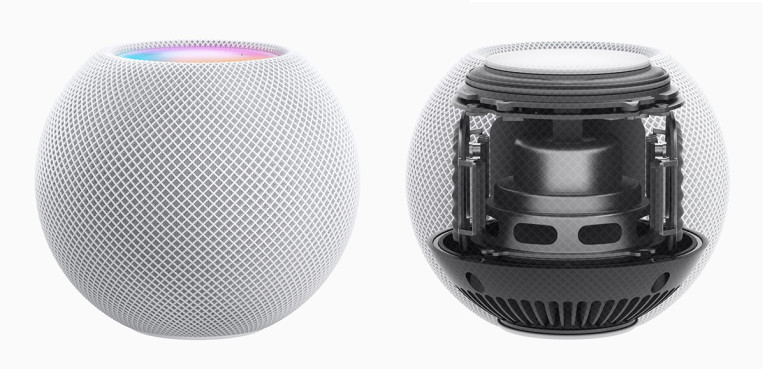
"HomePod mini has everything customers want in a smart speaker — amazing sound for listening to music, a world-class intelligent assistant that delivers a personal experience to each member of the household, and like every Apple product, it’s designed with privacy and security in mind," says Bob Borchers, Apple’s vice president of Worldwide Product Marketing. "HomePod mini is the ultimate smart speaker for anyone with an Apple device. It works effortlessly with iPhone to hand off music, answer calls, or deliver personalized listening suggestions, elevates the sound from Apple TV, plays music from a Mac, and so much more. There’s a lot of Apple innovation packed into such a small speaker, all at an affordable price."
"HomePod mini uses the intelligence of Siri to deliver a personalized experience for each member of a household. HomePod mini is designed to work with Apple Music, podcasts, radio stations from iHeartRadio, radio.com, and TuneIn, and in the coming months, popular music services including Pandora and Amazon Music. Multiple HomePod mini speakers work together to stream music or podcasts to multiple rooms, all in perfect sync. By placing two HomePod mini speakers in a single room, a stereo pair can be created for a wide soundstage, filling the space with rich, enveloping sound," the announcement adds.
Apart from the Siri voice interface, a touch surface right on top of HomePod mini lets users play, pause, skip a song, adjust the volume, or talk to Siri. And with the intelligence of Siri, the new HomePod mini will be able to deliver a personalized and deeply integrated experience for iPhone users. An important improvement was the revelation that Siri will now be able to identify different members of the same household. Siri will detect who is speaking and tailor music and podcasts to their preferences, and respond to personal requests, like accessing messages, reminders, notes, and calendar appointments, or making and answering phone calls. With that ability, Siri also offers users a personal update for a quick snapshot of their day. With a single request, users can ask Siri “What’s my update?” to hear the latest news, weather, traffic, reminders, and calendar appointments.
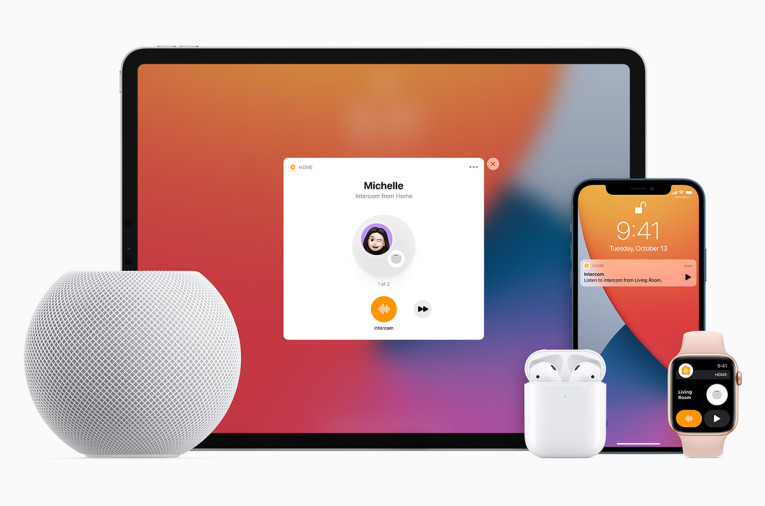
And as it could be expected, the HomePod mini works effortlessly with all Apple devices, making it easy to pick up an incoming call, listen to music on the Mac, or upgrade the TV experience by taking the sound from Apple TV to the next level. When listening to music on iPhone, users can simply bring their device close to HomePod mini and seamlessly hand off the music. And later in 2020, Apple confirmed that the experience will improve with visual, audible, and haptic effects when sound transfers from one device to the other. Personalized listening suggestions will also automatically appear on each user's iPhone when it is next to HomePod mini, and instant controls are available without having to unlock iPhone.
Apart from controlling smart home accessories easier than ever with simple voice commands for Siri to turn off the lights, change the temperature, lock the doors, or set a scene, the new HomePod mini is now the perfect smart home hub, providing access to all smart home accessories while users are at home or away.
Extremely interesting is the new Intercom feature that offers a quick and easy way for family members to connect with each other at home. One person can send an Intercom message from one HomePod to another — whether in a different room, a specific zone, or multiple rooms throughout the home — and their voice will automatically play on the designated HomePod speaker. Intercom works with iPhone, iPad, Apple Watch, AirPods, and CarPlay, so everyone in the household can get Intercom notifications and send Intercom messages from the backyard or on their way home.
And because security and privacy are fundamental to the design of Apple hardware, software, and services, the HomePod mini will move most of its intelligence to on-device, instead or relying on the cloud - which means also faster interactions in most cases. Only after “Hey Siri” is recognized locally on the device, or the user activates Siri by touch, will any information be sent to Apple servers. Requests are not associated with the user’s Apple ID, and personal information is not sold to advertisers or other organisations. To achieve improved capabilities, the HomePod mini works with iPhone to complete requests for messages and notes on device without revealing that information to Apple.
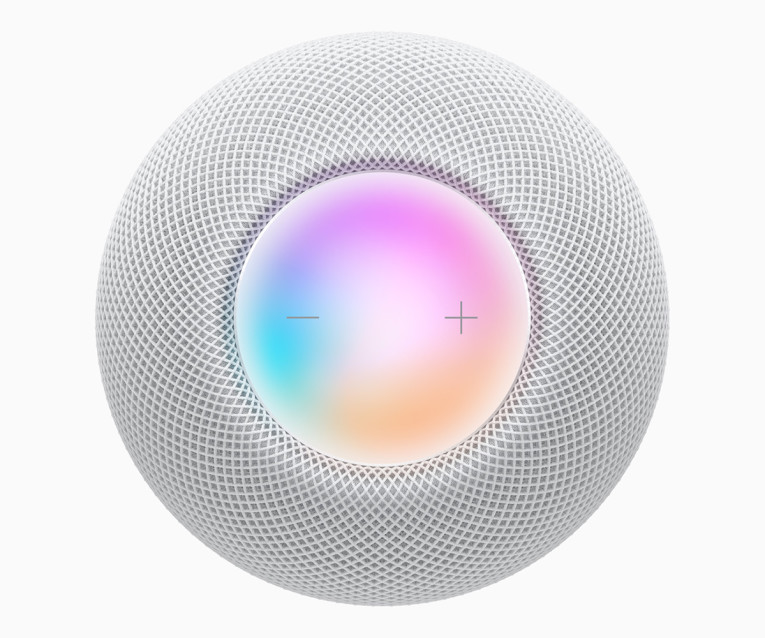
Finally, the new HomePod mini was designed according to Apple’s goals to have net zero climate impact across its entire business, which includes manufacturing supply chains and all product life cycles, by 2030. The HomePod mini uses 99 percent recycled rare earth elements, with the neodymium magnet in the speaker driver utilizing 100 percent recycled rare earth elements. The seamless mesh fabric is made with more than 90 percent recycled plastic, and all of the packaging wood fibers are from responsibly managed forests or recycled sources. The design is also free of mercury, brominated flame retardants, PVC, and beryllium.
HomePod mini uses power-efficient components and software that can intelligently power them down during periods of inactivity. For example, through optimized power management features and a high-efficiency power supply, the HomePod mini has been designed to be efficient in its low-power mode, where the majority of time is spent. The result is that the speaker is energy efficient right out of the box. "HomePod mini consumes 75 percent less energy than the stringent requirements for ENERGY STAR," states Apple.
The new HomePod mini will be available in white and space grey for $99 (US) in Australia, Canada, France, Germany, Hong Kong, India, Japan, Spain, the UK, and the US, from November 16. Later in 2020, the HomePod mini will be also available in China, Mexico, and Taiwan.
www.apple.com




